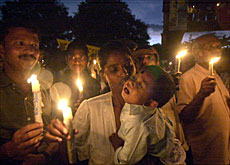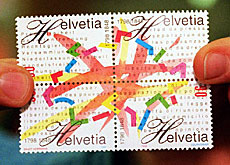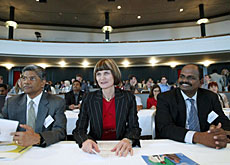Swiss aim to promote peace in Sri Lanka

Two years after a ceasefire was declared in Sri Lanka, the Swiss government is facing calls to boost its peace efforts in the country.
A parliamentary delegation said it was crucial to promote human rights and political reform in a country which is trying to leave behind nearly two decades of civil war.
Members of the cross-party group toured a number of Swiss-run aid projects while on a recent fact-finding mission in Sri Lanka.
“Everyone we met wanted peace and said they were tired of the war,” said Cécile Bühlmann, a Green Party parliamentarian and member of the delegation.
The civil war – which saw Tamil Tiger rebels fighting for a separate state in the Tamil-dominated northeast of the island – is estimated to have killed around 65,000 people.
The Swiss delegation said a ceasefire called in 2002 appeared to be holding, despite the fact that peace talks between the rebels and the Sri Lankan government had broken down.
The parliamentarians added that they hoped the ceasefire would remain in place after elections which are due on April 2.
Poverty concerns
Bühlmann told swissinfo she was struck by the poverty in some parts of the country, particularly the eastern regions which are mainly populated by the Tamils.
“The country is under a ceasefire – it’s not entirely at peace but it isn’t at war. We saw a lot of environmental damage and houses that had been destroyed,” she said.
“Sri Lanka is in the process of rebuilding itself, but the question is how long the peace will hold, because if there is a renewal of hostilities, rebuilding will probably be the first thing to be affected.”
At a press conference on Monday, members of the delegation said they were encouraged by Swiss efforts to promote the peace process and improve the humanitarian situation in Sri Lanka.
However, they stressed that it was vital for Switzerland to build on this work, particularly in the areas of human rights and in showing support for a new political system.
“Of course, we could do more for those who are in need,” said Bühlmann.
“But it’s not a question of giving more money – it’s a question of continuity, of staying there and getting our priorities right,” she added.
Swiss model
Switzerland’s federal system – which brings together different cultural and linguistic groups – has been proposed as a model for Sri Lanka as part of a peace plan brokered by Norway in February 2002.
Dick Marty, a member of the Swiss delegation in Sri Lanka and a centre-right Radical Party parliamentarian, stressed that Switzerland could complement Norwegian efforts by showing how different communities can peacefully co-exist.
Switzerland has strong ties with Sri Lanka and is home to 38,000 Tamils who have migrated to the country.
The Swiss Agency for Development and Cooperation spent SFr8 million ($6.4 million) on reconstruction in Sri Lanka last year.
Switzerland has also supported several rounds of talks between the two sides – the most recent in September 2003 – as well as efforts to clear land mines.
swissinfo, Isobel Leybold
Fighting between Tamil rebels and the Sri Lankan government broke out in 1984.
About 65,000 people have been killed in the conflict.
A peace plan, brokered by Norway, was signed in February 2002.
Peace talks stalled in February.
The Tamil Tigers are demanding an autonomous state in the northeast of the country.

In compliance with the JTI standards
More: SWI swissinfo.ch certified by the Journalism Trust Initiative



You can find an overview of ongoing debates with our journalists here. Please join us!
If you want to start a conversation about a topic raised in this article or want to report factual errors, email us at english@swissinfo.ch.